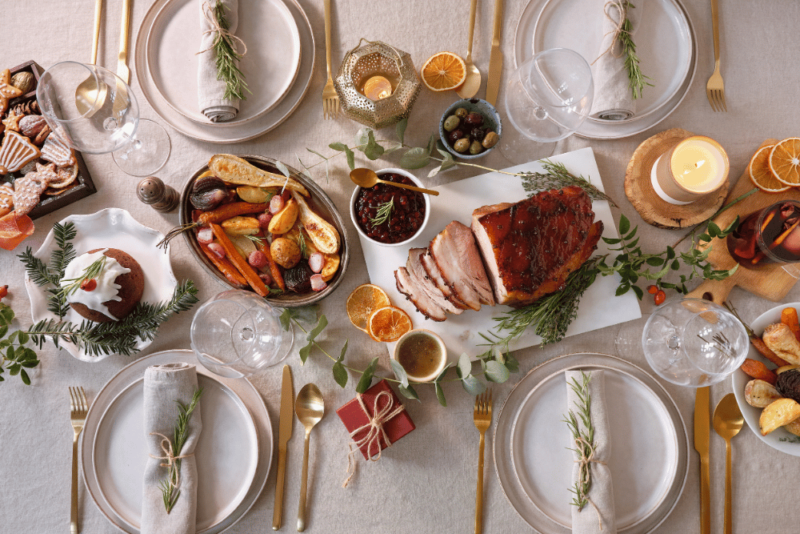
Food can be many things. It can be nourishing or comforting, a source of pleasure or a focal point of a holiday celebration. It can also be a catalyst for awkward feelings when someone at Christmas dinner or the office holiday party tries to push food on you that you’re not hungry for or you simply don’t want to eat.
Some food pushers are simply trying to be a good host. Others are looking for validation of their culinary wizardry. Still others view sharing food as an expression of love and caring — sometimes to the extent that they interpret refusing their food as rejecting their love or friendship. Sadly, some food pushers have conflicted relationships with food and can only feel “OK” about having dessert, a second helping, or another glass of wine if others do, too.
As we continue through the winter holidays, setting and defending your food boundaries firmly, yet graciously is a skill worth cultivating. I personally take my cues from the wisdom of Evelyn Tribole, co-author of “Intuitive Eating,” who created an Intuitive Eater’s Holiday Bill of Rights, including four points that relate to food pushers:
- You have the right to honor your fullness, even if that means saying “No, thank you” to dessert or a second helping of food.
- It is not your responsibility to make someone happy by overeating, even if it took hours to prepare a specialty holiday dish.
- You have the right to say, “No thank you,” without explanation, when offered more food.
- You have the right to stick to your original answer of “No,” even if you are asked multiple times. Just calmly and politely repeat, “No, thank you, really.”

Dealing with food pushers with grace
Fortunately, dealing with food pushers without stepping on toes is possible. I like the strategy of starting with a compliment and finishing with a deflection, such as “That looks delicious. I’m not hungry right now, but I’ll have some later” (helpful at an office party) or “The food was so fabulous…I literally could not eat another bite” (useful at a sit-down meal). If needed, nicely but firmly add a, “No, really…I just wouldn’t be able to fully appreciate it right now.”
What If you really would like to try the dessert, but know it would leave you feeling uncomfortably full? Ask if you can take a serving home to enjoy the next day.
One strategy I don’t recommend? Saying, “Sorry, but I’m on a diet.” Not only is diet talk not cool — especially at the holiday table — but the pusher may feel like you’re calling their food unhealthy, or judging them for preparing and eating it. They may push even harder with lines like, “Come on, you have to enjoy yourself sometimes.” As if that’s your only chance to enjoy food, or life. In any case, feeling too full can dull the pleasure of an otherwise enjoyable meal.
Another strategy to avoid? Pretending to have a food allergy. You run the risk of being caught out someday (“I thought you said you were allergic to chocolate.”), which makes it harder for those who truly have food allergies to be believed.
That said, if you have to avoid nuts because of an allergy, or those wheat dinner rolls because you have celiac disease, say so! You may have to do some quick education about cross-contamination.
At a small company I worked for years ago, one of my coworkers had a serious tree nut allergy. When the boss brought in a tray of layered bar cookie things and proudly told my coworker that she only put nuts in half the tray, it made things awkward for my coworker, but her health depended on explaining why any nuts anywhere in that tray would likely expose her to allergens that could cause anaphylactic shock.

Why rehearsal can be helpful
If you have people-pleasing tendencies, it can help to rehearse what you’ll say in advance. This is especially important if you do have a food allergy or an intolerance such as celiac disease.
It’s also important if you will be dealing with known food pushers, and you found yourself capitulating or simply not handling things very gracefully in the past.
I don’t typically recommend putting a lot of mental effort into trying to forecast future situations and conversations that may never even happen — or at least not happen as we imagine them. However, if you you’ve found it challenging in the past to say “no” and mean it in specific situations or with specific people, it can be helpful to rehearse what you will say in response to “eat this!” entireties you think you’re likely to encounter.
It can also be helpful to mentally rehearse how you want to feel at the end of the dinner, party or whatever shape the food-related event takes. Do you want to feel comfortably full and happy that you made food choices that were satisfying, or do you want to feel uncomfortable and disappointed that you ate food you just weren’t all that into?
It takes a little practice to say “no” to good food intentions, but stick with it. Boundary setting is a form of self-care, a way of making sure your needs are met. When you learn how to honor your needs — food-related, or otherwise — while respecting the feelings of others, everyone wins.
Carrie Dennett, MPH, RDN, is a Pacific Northwest-based registered dietitian nutritionist, journalist, intuitive eating counselor, author, and speaker. Her superpowers include busting nutrition myths and empowering women and men to feel better in their bodies and make food choices that support pleasure, nutrition and health. This post is for informational purposes only and does not constitute individualized nutrition or medical advice.
Seeking 1-on-1 nutrition counseling? Learn more about her Food & Body, IBS management, and nutrition counseling programs, and book an intro call to see if the program is a good fit, and if we’re a good fit!
Want exclusive content on nutrition, health, diet culture and more, plus critiques of nutrition and health journalism? Subscribe to my Food Noise newsletter!
 Print This Post
Print This Post




